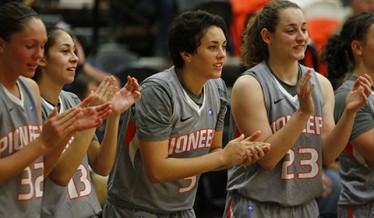Alumna awarded prestigious NCAA scholarship
Open gallery

Kristina Williams BA ’13, one of Lewis & Clark’s most accomplished NCAA women’s basketball player, has received the highly-sought after NCAA Women’s Enhancement Program Postgraduate Scholarship for Careers in Athletics. She is pursuing a Master’s Degree at Smith College, and will use the scholarship to cover part of the educational costs at Smith. The Career Development Center is excited to share her unique story and advice with current students and young alumni.
Name: Kristina Williams
Graduation Year: 2013
Hometown: El Dorado Hills, CA
Graduate Program: Masters of Science in Exercise and Sport Studies at Smith College
Major at LC: Psychology with a minor in math
Career Development Center: What inspired you to pursue a Masters of Science in Exercise and Sport Studies?
Kristina Williams: The positive impact that sports had on my life as well as my teammates’ and fellow athletes’ lives is a big reason why I became interested in pursuing a Masters of Science in Exercise and Sport Studies. When I first started my search for a masters program that would fit my interests, I was looking more towards a masters in sports psychology. However, after spending the last winter season coaching women’s basketball at my high school alma mater, I realized coaching would be the perfect platform for me to have a positive impact in the lives of student athletes, just as my college and high school coaches did for me. Coaching basketball also allows me to be surrounded by the game I love on a daily basis. The program at Smith is specifically geared at training graduate students to be Head Women’s Athletic Coaches at the collegiate level. While I will take some sports psychology classes at Smith, I will also take classes such as Collegiate Recruiting, Sport Leadership for Coaches, and the Philosophy and Ethics of Exercise and Sport.
CDC: Between practices, games, classes, and other activities, student athletes at Lewis & Clark are usually quite busy. Is there any advice you would like to give our current student athletes or the women you will coach at Smith on how to maintain a sense of balance?
KW: Life as a student athlete can be quite hectic at times. My best advice to current and future student athletes is to make sure you take advantage of your free time. Free time does not come often, and when it does come, make sure you are doing something that will help you recharge so that when it is time to be productive and work hard again, you will be ready and eager to engage. Our minds are very powerful; if we can keep them positive, motivated, and happy, we will be able to consistently work at a high level towards short-term and long-term goals.
CDC: What advice would you give about preparing for and applying to graduate school?
KW: This varies based on when you are choosing to attend graduate school. I determined that it was best for me to take a year off after graduating to recharge and get some more real-world work experience coaching and teaching. I also spent time traveling, and I now feel very ready to get back to school. For others, going to graduate school right after receiving their undergraduate degree might be the best option based on the field of study, financial situation, and personal preference. In either situation, my first piece of advice would be to find out what entrance exams are required for the program you will be applying for, and get the exams out of the way early. I actually took the GRE for the first time in the summer when my applications were not due till December, and this was very beneficial for me. My second piece of advice would be to give your teachers, mentors, bosses or whomever might be writing your letters of recommendation for you plenty of time to write and submit their letters before the application deadlines. We all live busy lives, and I am sure they will appreciate the advanced notice.
CDC: How has your liberal arts education prepared you for life beyond college?
KW: I feel the education I received at Lewis & Clark has put me ahead of the game. For example, while assistant coaching for my high school alma mater, I am able to analyze statistics using the knowledge I gained in Professor Yung-Pin’s stats classes. I can create background music for a highlight reel of our team’s season using skills I gained in Professor Leonard’s electronic music class. I can listen to and observe the varying social behaviors of players on the team to determine the best way to motivate each one of them to perform at their highest level from knowledge I gained in Professor Cole’s social psychology course as well as Professor Brian Dewtweiler-Bedell’s advanced social psychology course. Those are just a few examples, and I have many more I could share. The combination of courses I took at Lewis & Clark has provided me with a broad knowledge base, which allows me to be successful in my current work and made me a competitive graduate school applicant.
More Career Center Stories
Career Center is located in room 270 of Fowler Student Center on the Undergraduate Campus.
MSC: 175
email careers@lclark.edu
voice 503-768-7114
Director Rocky Campbell
Career Center
Lewis & Clark
615 S. Palatine Hill Road MSC 175
Portland OR 97219

